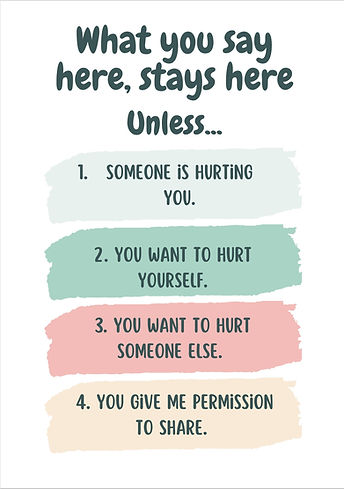"Believe you can, and you're halfway there." -Theodore Roosevelt


Services Provided
Counselors provide many services (as listed under a counselor's role). This gives a deeper look into what the main three areas look like for your students.

Classroom Counseling
Classroom lessons are guidance/counseling lessons or activities that promote attitudes, knowledge, and skills in those main three areas of counseling discussed under a counselor's role. Classroom lessons give counselors the chance to get to know the students and have the students know the counselor as well!
Possible topics include: coping skills, friendship/social skills, tattling vs reporting, bullying, handling teasing, feelings, academic skills/behaviors, conflict resolution, and personal safety.

Individual Counseling
There are times when a student may benefit from one-on-one counseling or may need to speak privately about something with the school counselor. Many times, these topics include school stress, test anxiety, friendship troubles, self esteem, and more. Students are able to come by and see the counselor whenever I am in my office or by leaving a note in the box next to my door.
Please note that individual counseling with the school counselor is short term. We do have an on-site school-based mental health therapist should your student need more support. More information can be found under the Summit Counseling tab.

Group Counseling
Small group counseling helps students in areas where others may be struggling as well and helps them find connection in those difficult moments. Groups typically consist of 4-8 students within the same grade band/age range and last for 30-minutes on a weekly basis. These groups range from 4-8 weeks long. These groups are coordinated with teachers to miss the least amount of instructional time possible, and parent permission is always required before a student joins a group.
Some groups topics may consist of: coping skills, positive interaction with peers, study skills, conflict management, shifting family dynamics, or self-confidence.
The school counselor at Creek View Elementary School is also a part of the administration team and works closely with the MTSS specialist, including the implementation of special accommodations; however, 504 and MTSS questions should be directed towards Rhiannon (Annie) Linton.
Confidentiality
Confidentiality is an ethical and legal obligation for a counselor when counseling a student to keep that information between them. Confidentiality is the ethical and legal term ascribed to the information communicated within the counseling relationship, and it must be maintained unless keeping that information confidential leads to foreseeable harm. “Serious and foreseeable harm is different for each minor in the school setting and is determined by students’ developmental and chronological age, the setting, parental rights and the nature of harm” (ASCA, 2022).
Exceptions to confidentiality exist, and students should be informed when situations arise in which school counselors have a responsibility to disclose information obtained in counseling relationships to others to protect students, themselves or other individuals. Privileged communication between a school counselor and a student is a legal term granting protection to information shared in a counseling relationship only if said privilege is granted by federal or state statue. If privilege applies it can provide additional safeguards to confidential information.

General Overview
We all share a common and critical goal for our children to be safe and protected from all things harmful. In support of this goal, elementary school teachers and counselors will present annual lessons to students designed to increase their personal safety and protection. The Think First & Stay Safe™ program is a research-based program that teaches specific personal safety education by way of interactive classroom lessons, classroom posters, role-plays and corresponding activities. Think First & Stay Safe™ enables students to take an active and necessary role in protecting themselves from harassment, abduction, bullying, exploitation, and various forms of abuse (physical, sexual, emotional). The Health Advisory Committee reviewed and approved this program and selected components will be implemented through the elementary health curriculum by teachers and school counselors.
Since this topic is so important and can be sensitive in some aspects, please know that I take into account any prior history of any student and review the materials before they are presented. They are currently being updated to reflect new standards. Key concepts will be taught to all grades as well as some grade specific modifications. Should there be any questions regarding the materials or what is discussed, please contact me at jamese3@fultonschools.org.
Key Concepts
-
You can use your built-in computer and make safe choices
-
People are like the weather. Most are safe, but they can change.
-
Lures are tricks used to get children away from safe adults and safe place.
-
Laws help protect children and there are adults who can help you.
-
Your instincts help keep you safe.
-
A stranger is someone you don’t know.
-
Someone may even use threats to trick you.
-
No one can take away your dignity.